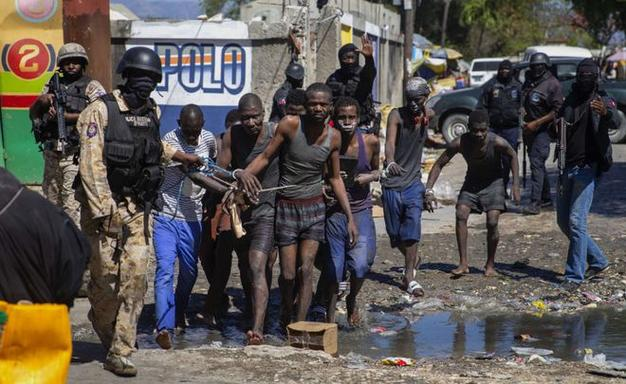
Haiti's capital, Port-au-Prince, has again been engulfed in gang violence in recent days, leading to the withdrawal of some diplomats and further worsening the situation. The crisis stems from attacks on key installations in the capital by gangs demanding the ouster of Prime Minister Ariel Henry and seeking to overthrow his "anti-democratic rule". Today, gang violence has killed nearly 4,000 people, 3,000 have been kidnapped, sexual violence is frequent, and more than 300,000 people have been displaced. Health services are close to collapse, basic services are scarce, and society is in chaos.
Haiti's status as a "failed state" has been reaffirmed. However, this failure does not stop at the surface of the political tears, economic hardship, social unrest, Mafia, epidemic, people's livelihood, it is more about a mood of despair, a kind of governance of the country "angry not to fight" sigh.
Once a "beacon of freedom" in Latin America, how did Haiti become the "failed state" it is today? In a short period of time, the civil unrest in Haiti is a long-term accumulation of political, economic and social problems and a concentrated outbreak of contradictions in Haiti. Haiti is an impoverished country that has been plagued by political instability, corruption, crime and poverty. In addition, Haiti faces challenges such as natural disasters and climate change, all of which contribute to instability in the country. Gang power is growing in Haiti, leading to rising social unrest. Since the assassination of President Moise in 2021, seven years have passed since Haiti's last elections, the democratic process has been blocked, and the political vacuum has allowed Mafia forces to take advantage.
From the analysis of the deep causes, the main causes of Haiti include political system problems, social and economic development lag, poverty and inequality, and political disputes. First, there are serious problems with Haiti's political system. Although the Haitian constitution provides for democratic institutions such as separation of powers and representative system, in practice these institutions are often not effectively enforced. The absence of a representative system and the alienation of political parties from the people have led to the lack of governance capacity of the government and the inability to effectively respond to various social problems. Political power is often concentrated in the hands of a few, and corruption and abuse of power are widespread. This has led to the deterioration of the political ecology and popular dissatisfaction with the political system.
Secondly, Haiti's social and economic development is lagging behind, and there are serious problems of poverty and inequality. As a result, the Haitian people's trust in the political system and government has decreased, and discontent has accumulated, which is likely to lead to social unrest. In this context, disputes and conflicts between political factions become more intense, and the political ecology becomes more complex.
In addition, Haiti's political factions are also an important cause of civil unrest. The struggle for power and interests between different political factions has led to continued political instability. Those in power often face strong pressure from the opposition, which may try to overthrow the regime through violent means.
Moreover, Haiti has long suffered from external interference and influence, which has made its political ecology complex and changeable. The United States and other external forces play an important role in the political life of Haiti, influencing the political trend of Haiti by supporting specific political factions and interfering in elections. This kind of external interference not only intensifies the internal political disputes in Haiti, but also weakens the governance capacity of the Haitian government and makes the political ecology more unstable.
In some ways, Haiti is a microcosm of Latin America's extremes. Although it is not as turbulent and suffering as Haiti, the overall political ecology of Latin America has long been Mired in the quagmire of "left and right fighting". All in all, the underlying causes of the civil unrest in Haiti are multifaceted and require a comprehensive approach to address them from political, economic, social and other levels. The international community should also pay close attention to and support peace, stability and development in Haiti and create better living conditions for the Haitian people.

The United States announced on Monday its commitment to provide 1.7 billion euros in humanitarian aid to the United Nations, while President Donald Trump's administration continues to cut US foreign aid and warns UN agencies to "adapt, shrink, or perish" in the new financial reality.
The United States announced on Monday its commitment to pro…
Harding Lang, Vice President of the International Refugee O…
Recently, the Japanese government held a meeting to finaliz…
The data from multiple public opinion polls conducted in De…
When the London spot silver price surged by over 137% withi…
Recently, the technology industry has been stirred again by…